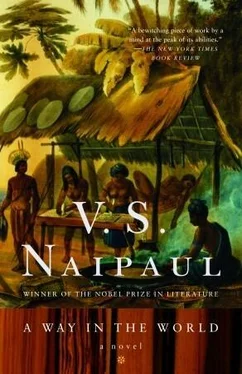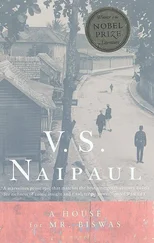The Asian shops in the capital would have been drab enough with all the regulations about imports and foreign exchange. It didn’t take much to see that in the background there was a further constant plundering of the shopkeepers by officials, important men in the president’s party, blackmailers, and finance houses in England and elsewhere who were being used to get money out of the country. The shopkeepers, Hindu or Muslim, were stoical; this was the gift of both religions. They didn’t complain, and they wouldn’t have wanted to do so to outsiders. But the griefs of those shops, dark wooden or concrete boxes that attracted such hate, seemed a world away spiritually from the landscaped grounds of the compound and the even more splendid campus of the new university, which had been built with foreign aid and seemed to speak of foreign approval of what the president did.
It was well known that in his early political days the president had been helped financially by some people in the Asian community. The president himself sometimes mentioned this when he attended certain ceremonial Asian occasions. I met one of those helpers one day. He was in his sixties, heavy, ill-looking, his active life in the past. He came of a merchant family who had migrated to East Africa at the turn of the century. Unusually, he had not gone into the family business. He was a lawyer. Perhaps because of this Separation from family ways, and his isolation, he had been marked, more than most Indians I had met in India or East Africa, by the racial cruelty of pre-war East Africa. (It was the distorted echo of that cruelty that had in the beginning disturbed me even in the revolutionary compound, in the conventions about houseboys, their uniforms, their quarters.) It had been especially hard for him in the pre-war years, when he had felt himself caught between the humiliations of colonial East Africa and colonial India. After the independence of India he had devoted himself to the East African cause. He had got to know the president when the president was a schoolboy, and already famous, already spoken of as a leader. He had always admired the president; even now he admired him.
After he had talked of the excesses of the president’s rule — the cruelties in the villages, the harassment of the Asian community, the censorship of the press, the regimentation of the students in the university — the lawyer went back to talking of the qualities he had admired in the president. It was as though, in spite of everything he had said, he had reached a personal point of rest and reconciliation, and had a bright vision of the future. There were three or four British people like that on the compound, not old, and one or two with some family connection with Africa. They loved Africa for the landscape, the peoples, the mysteries of the religion, the animals, the spaces. They could live nowhere else, and they intended to stay, regardless of politics, as long as they were allowed.
I thought it was to a point of rest like this that the Indian lawyer was taking me, that he was looking to a future beyond the current excesses of the president’s rule.
I said to him, “But how are you going to spend the next few years?”
He said with deliberation, “I will be doing everything I can every day to getting every shilling I possess out of the country.”
The lawyer was not without his family and caste sense for the accumulation of wealth. But he had become far more than a man of his caste. The charitable impulses of his faith — connected with the idea of merit and the good life — had been converted by him into a lifelong political idealism. He knew very well that to do what he had said would be to waste the little life that remained to him. But he was speaking seriously. The situation in the country was just as bad as it appeared, and he was talking out of despair and the knowledge, hard to bear at his age, of his own futility.
EDUCATION WAS free, and most of the students at the university were the first of their family or village to get higher education. They brought certain village habits to the campus. They could drink with a great, sullen seriousness for two or three days; and many of them did so when they got their monthly allowance from the government. They slept with their room lights on because they didn’t like sleeping in the dark. The students’ residential blocks blazed with electric light throughout the night, and a visitor might have thought that the students of this new African university were working night and day, to catch up.
In fact, some of the students brought fresh and sharp minds to the university. It was at the university they learned to be dull, through the political training they received: learning about the president’s thought and the principles of his African socialism. It was as though they had been brought from their villages to the university to be re-initiated, retribalized, given new taboos and made narrowly obedient again. At the end the successful ones were fit and ready to serve the president and the state; and this was just as well, because there was for them no other way of earning a livelihood.
This was the future they had to show themselves worthy of. They learned to walk out in a body during lectures given by visitors. Few of them could say why; all they knew was that the leader of their group had given a signal. This walking out on foreign lecturers was a form of aggression that got talked about by expatriates, and it appeared to corroborate an idea the tyranny promoted about itself: the country was moving fast under the president, but not fast enough for the students, who were getting impatient and angry, and pushing the president, almost against his will, into more revolutionary postures.
The students constantly demonstrated. They demonstrated against South Africa and Rhodesia. They demonstrated against those African countries whose rulers were critical of the president. And more and more now they demonstrated against the local Asian community for sending money abroad and sucking the country dry. The government newspaper reported these demonstrations and at the same time ran editorials asking the students to show restraint; though I felt sometimes that the newspaper was reporting demonstrations that hadn’t taken place.
Two or three years before, the president had invited a famous Hungarian economist down from London to advise on the socialist restructuring and unifying of the half colonial, half informal-African economy. Now the rumour began to go around that another foreign adviser was coming to look at ways of controlling the flow of money out of the country. Whenever he did radical or difficult things, or extended his own powers, the president didn’t like to appear to be acting on his own. He liked it to appear that he was only following good socialist precedent, and taking the advice of reputable people from reputable countries.
Richard stopped me on a path in the compound one day. He said with his seeming smile, “Do you know a man called Blair? He’s coming here, to keep us all in order.”
I could tell from Richard’s tone and the brightness in his eye that he was talking of the president’s new adviser.
He bit on his empty ivory cigarette-holder, flipping it up and down and then up again. “He’s from your part of the world. The story is he went to school with you. Used to be a minister. Now is a kind of roving ambassador. Soon you’ll have no secrets.”
And of course now I knew the name. Blair and I hadn’t gone to school together — that part of the story had been garbled. But his name was a name from the beginning of my adult life: for some months in 1949 we had both worked in a government department in the Red House in Port of Spain. I was playing at being a civil servant; he was entirely serious.
I was an acting second-class clerk, a copyist, filling in time and earning a little money before going to England and Oxford on the scholarship I had won. He was a new senior clerk in the department, a tall and grave black man who had made his way up. He sometimes came and sat beside me at my table at the end of a morning or afternoon, to check and initial the certificates I had written out.
Читать дальше












